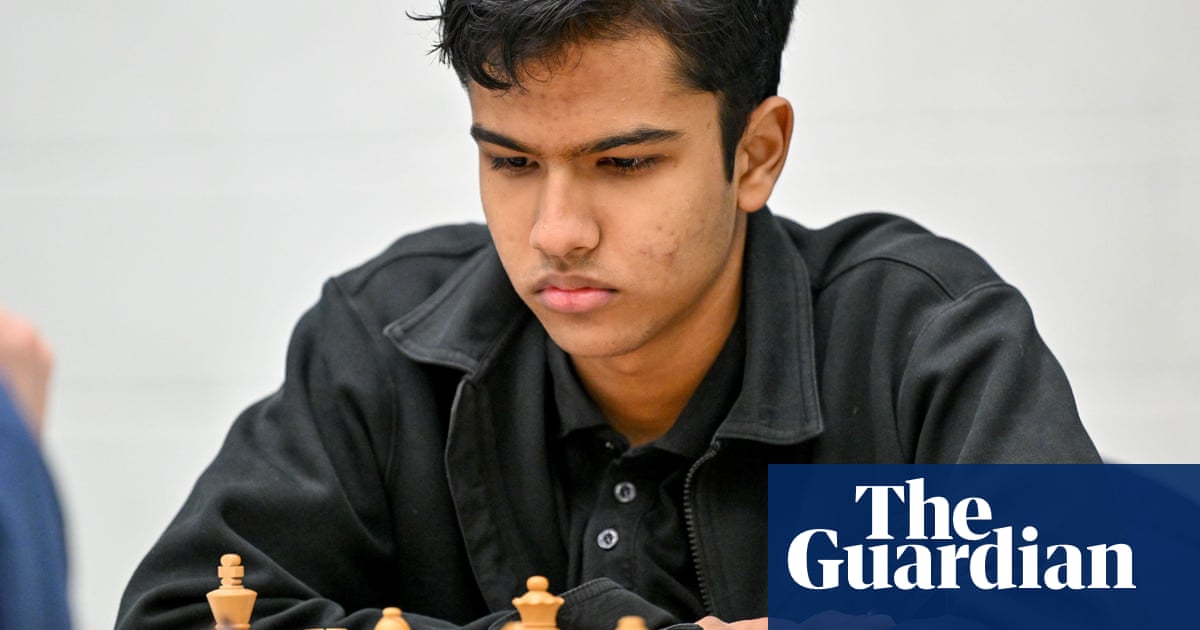The Four NationsChessLeague (4NCL) is a bedrock of British chess. Staged over 11 rounds and five weekends from October to May at Midlands hotels, with teams of eight in the top division and six in divisions two to four, it attracts players from club level to grandmaster, many of whom do not compete in any other national event. Its organisation, by the English Chess Federation chief executive, Mike Truran, and a hardworking team of arbiters, is consistently excellent.
As expected, the 2024-25 season ended last Monday with a close 11th round match between the favourites and defending champions, Wood Green, and the winners for the two previous years, Manx Liberty. The outcome was a rarity. All eight games were drawn for a 4-4 scoreline, although most were hard fought and Manx missed a winning endgame chance.
Contrary to predictions, the title was already decided in the previous round when The Sharks, who had tied 4-4 with Manx in round nine, defeated Wood Green 4.5-3.5.
Final leading scores were Manx Liberty 20/22 match points, Wood Green 17, Wood Green Youth 16, Chessable White Rose 16, Cheddleton Savills Catering 13, The Sharks 13, CSC/Kingston 11.
In previous seasons the top teams often brought in a world-class wildcard for the final weekend. This time Wood Green added the eight-time British champion Michael Adams, who duly delivered one of the best games of the weekendin round 10, complete with bishop and knight sacrifices, but was held to draws in the crunch matches of rounds nine and 11.
Manx, who in their previous winning seasons had brought in the Fire on Board author, Alexei Shirov, for the decisive rounds, opted instead for a different approach, signing up the 2022 British champion, Harry Grieve, and England’s youngest grandmaster, Shreyas Royal, for the whole season to supplement their core squad of Romanian, Hungarian and Polish GMs and IMs.
It worked brilliantly. Grieve, with 9.5/11, amassed the highest points total of any player in the top division, while Royal’s 8/11 included a streak of six consecutive wins. The outcome should encourage Grieve, 24, to make a renewed push for his third and final GM norm, while Royal is now consistently producing 2500-rated performances. Grieve won in stylein this game.
The human story of the weekend was Richard Pert scoringhis second GM normat age 44, 19 years after his first norm which was also achieved in the 4NCL, watched by his twin brother, Nick, his son Max and his daughter Nina, who all played in the same Cheddleton Savills Catering team on Sunday. Victory was no easy matter, for his opponent needed a win for his own IM norm. The Pert family celebrations continued on Monday when Nina, 16,checkmated an international master.
Additionally to Richard Pert, Tom O’Gorman of The Sharks and Ireland scored his first GM norm, Zoe Varney of Blackthorne and England her second WIM norm, and Svyatoslav Bazakutsa of Wood Green and Ukraine his second GM norm.
The 4NCL has an important role in developing young British talent. England’s star junior of the moment is Supratit Banerjee, 11, of Coulsdon, Surrey, who plays for the CSC/Kingston 4NCL team. Banerjee’s Fide rating has surged impressively this year, rising over 170 points in four months to his current2312 Fide Master level. In that period he has played more than 100 games, with tournaments in Spain and Hungary as well as in England.
Sign up toThe Recap
The best of our sports journalism from the past seven days and a heads-up on the weekend’s action
after newsletter promotion
At 11 years and two months, Banerjee has a serious chance to surpass the UK record of Luke McShane and David Howell, who became international masters at 13 years and two months in 1997 and 2004 respectively. Royal did it at 13 years and seven months and Nigel Short at 14years and six months, while Freddy Waldhausen Gordon, at 14 possibly Scotland’s best ever talent, now has the required three norms and 2400 rating and expects his IM title to be ratified at the next Fide council meeting.
It is not a done deal for Banerjee, as some talents hit a ceiling above 2300 but miss out on the higher level. He scored 6.5/11 for CSC/Kingston in the 4NCL season including thisround seven win, but there was a warning sign in the final round when his gung-ho attack led to defeat. One of Banerjee’s coming norm opportunities will be at theKingston Invitationalin August, organised by the Guardian’s Stephen Moss.
At international level, the boy to watch is Roman Shogdzhiev. The Russian, already world under-eight champion with 11/11 and world under-10 champion with 10/11, achieved his first IM norm last year aged nine, and has justscored his second IM normat the Baku Open, registering a tournament performance of over 2500. Shogdzhiev is now on track to break the record of Argentina’s “chess Messi” Faustino Oro as the youngest ever international master.
The Garry Kasparov of the 21st century? In 1975, this column forecast that the then unknown 11-year-old Garik Weinstein (later Kasparov) would succeed Anatoly Karpov as world champion by 1990. Now, Shogdzhiev looks the part as the player to restore Russia’s lost chess glories in the next decade.
3971:1 Qxh6+! Kxh6 (if gxh6 2 Rxh8 mate) 2 Rxh8+ Kg5 3 Rh5 mate.
